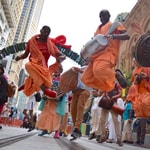Flying Monk – Details, episodes & analysis
Podcast details
Technical and general information from the podcast's RSS feed.

Flying Monk
Harinamananda Das
Frequency: 1 episode/6d. Total Eps: 70

Recent rankings
Latest chart positions across Apple Podcasts and Spotify rankings.
Apple Podcasts
🇬🇧 Great Britain - spirituality
04/07/2025#99🇫🇷 France - spirituality
22/02/2025#89
Spotify
No recent rankings available
Shared links between episodes and podcasts
Links found in episode descriptions and other podcasts that share them.
See all- https://www.youtube.com/hashtag/success
423 shares
- https://www.youtube.com/hashtag/life
130 shares
- https://www.youtube.com/hashtag/death
110 shares
RSS feed quality and score
Technical evaluation of the podcast's RSS feed quality and structure.
See allScore global : 33%
Publication history
Monthly episode publishing history over the past years.
Krishna delivers us in Style - SB 1.13.50 - Gold Coast, Australia
mercredi 22 janvier 2025 • Duration 37:20
The Science of Blessings - SB 1.13.31 - Gold Coast, Australia
mardi 7 janvier 2025 • Duration 45:41
Harinama Everyday! Keeps Maya Away! - BG 7.14 - Pretoria, South Africa
lundi 14 octobre 2024 • Duration 01:06:43
The Mahatma Business - BG 9.14 - Johannesburg, South Africa
vendredi 4 octobre 2024 • Duration 48:16
Live without Anxiety - Cape Peninsula University of Technology - Cape Town, South Africa
mercredi 2 octobre 2024 • Duration 44:34
Talk to university students about how to live a life without anxiety.
Preparing for Life's Exam - University of Cape Town - Cape Town, South Africa
mercredi 2 octobre 2024 • Duration 01:00:50
Are you preparing for your career after death?
Takeover of Mercy - SB 3.21.41 - Cape Town, South Africa
mardi 1 octobre 2024 • Duration 51:17
Translation
The area resounded with the notes of overjoyed birds. Intoxicated bees wandered there, intoxicated peacocks proudly danced, and merry cuckoos called one another.
Purport
The beauty of the pleasant sounds heard in the area surrounding Lake Bindu-sarovara is described here. After drinking honey, the black bees became maddened, and they hummed in intoxication. Merry peacocks danced just like actors and actresses, and merry cuckoos called their mates very nicely.
Be in Harmony with Nature - SB 3.21.42-43 - Cape Town, South Africa
vendredi 27 septembre 2024 • Duration 42:53
TRANSLATION
Lake Bindu-sarovara was adorned by flowering trees such as kadamba, campaka, ashoka, karanja, bakula, äsana, kunda, mandära, kutija and young mango trees. The air was filled with the pleasing notes of kärandava ducks, plavas, swans, ospreys, waterfowl, cranes, cakraväkas and cakoras.
PURPORT
For most of the trees, flowers, fruits and birds mentioned here as surrounding Bindu-sarovara Lake, English synonyms cannot be found. All the trees mentioned are very pious in that they produce a nice aromatic flower, such as the campaka, kadamba and bakula. The sweet sounds of waterfowl and cranes made the surrounding area as pleasant as possible and created a very suitable spiritual atmosphere.
Bathe in the God's Teardrops - SB 3.21.38-39 - Cape Town
mardi 24 septembre 2024 • Duration 45:37
TRANSLATION
The holy Lake Bindu-sarovara, flooded by the waters of the river Sarasvati, was resorted to by hosts of eminent sages. Its holy water was not only auspicious but as sweet as nectar. It was called Bindu-sarovara because drops of tears had fallen there from the eyes of the Lord, who was overwhelmed by extreme compassion for the sage who had sought His protection.
PURPORT
Kardama underwent austerities to gain the causeless mercy of the Lord, and when the Lord arrived there He was so compassionate that in pleasure He shed tears, which became Bindu-sarovara. Bindu-sarovara, therefore, is worshiped by great sages and learned scholars because, according to the philosophy of the Absolute Truth, the Lord and the tears from His eyes are not different. Just as drops of perspiration which fell from the toe of the Lord became the sacred Ganges, so teardrops from the transcendental eyes of the Lord became Bindu-sarovara. Both are transcendental entities and are worshiped by great sages and scholars. The water of Bindu-sarovara is described here as sivämrta jala. Siva means "curing." Anyone who drinks the water of Bindu-sarovara is cured of all material diseases; similarly, anyone who takes his bath in the Ganges also is relieved of all material diseases. These claims are accepted by great scholars and authorities and are still being acted upon even in this fallen age of Kali.
Destroy all Bad Karma - SB 6.1.15 - Burgas, Bulgaria
samedi 21 septembre 2024 • Duration 32:07









